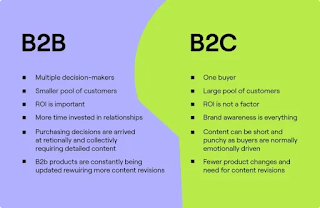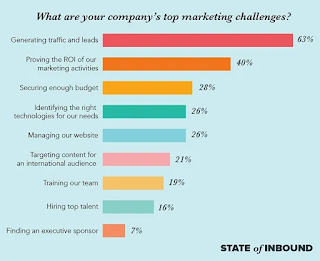The Ultimate Guide to B2B Marketing: Strategies, Tips, and Trends
Introduction
B2B marketing, or business-to-business marketing, refers to the practice of promoting and selling products or services to other businesses or organizations that will use them to support their own work or incorporate them into their own products and services.
Key Differences Between B2B and B2C Marketing
1. Target Audience - B2B marketing focuses on a specific target audience of other businesses, while B2C marketing targets individual consumers.
2. Decision-Making Process - B2B purchases typically involve a longer and more complex decision-making process, often involving multiple decision-makers.
3. Relationship Building - In B2B marketing, relationship building plays a crucial role in the sales process.
4. Marketing Tactics - B2B marketing often involves more targeted and personalized marketing tactics, such as account-based marketing.

Benefits of B2B Marketing
1. Stronger Customer Relationships
2. Increased Brand Awareness
3. Higher Lead Quality
4. Increased Revenue
B2B Marketing Strategy
1. Define Your Target Audience
2. Set Clear Goals and Objectives
3. Create a Strong Value Proposition
4. Determine Your Unique Selling Proposition
5. Develop a Content Marketing Strategy
6. Build a Strong Brand
7. Leverage Social Media
8. Utilize Email Marketing
9. Invest in SEO and PPC Advertising
10. Measure Your Results
Types of B2B Marketing
1. Content Marketing
2. Email Marketing
3. Search Engine Optimization (SEO)
4. Pay-Per-Click Advertising (PPC)
5. Social Media Marketing
6. Influencer Marketing
7. Account-Based Marketing (ABM)
Understanding Your Target Audience
1. Conducting Market Research
2. Creating Buyer Personas
3. Identifying Pain Points
4. Analyzing Customer Behavior
Creating Valuable Content for B2B Marketing
1. Establishing Thought Leadership
2. Creating Educational Content
3. Utilizing Case Studies and Testimonials
4. Sharing Industry News and Trends
The Role of Social Media in B2B Marketing
1. Building Brand Awareness
2. Generating Leads
3. Establishing Thought Leadership
4. Promoting Content
Measuring Success in B2B Marketing
1. Setting Measurable Goals
2. Tracking Key Performance Indicators (KPIs)
3. Analyzing Data
4. Adjusting Your Strategy
The Future of B2B Marketing
1. Increased Focus on Personalization
2. Growing Importance of Account-Based Marketing
3. Increased Use of Artificial Intelligence and Machine Learning
The future of B2B marketing is constantly evolving with advancements in technology and changing business landscapes. As companies shift their focus to digital channels and online interactions, B2B marketers must adapt to keep up with the changing times. This means leveraging innovative tactics to attract, engage, and convert leads while building long-term relationships with customers.

One of the key areas where B2B marketing is likely to grow is in the use of artificial intelligence (AI) and machine learning (ML). These technologies are increasingly being used in areas like predictive analytics, personalization, and chatbots, allowing businesses to provide more targeted and customized experiences for their customers. This can lead to higher engagement rates, better lead generation, and ultimately, increased revenue.
Another area where B2B marketing is likely to see growth is in the use of social media platforms. While B2B marketers have traditionally focused on more traditional channels like email and trade shows, social media provides a unique opportunity to reach new audiences and engage with customers in real-time. With the growing use of social media platforms like LinkedIn and Twitter, B2B marketers can connect with potential customers and build relationships in a way that was not possible before.
Content marketing is also likely to continue playing a significant role in B2B marketing in the coming years. As businesses continue to create and distribute content across a variety of channels, it is important for B2B marketers to focus on providing high-quality, valuable content that resonates with their target audience. This can help build brand awareness, establish thought leadership, and ultimately, drive conversions.
Overall, the future of B2B marketing is likely to be shaped by a combination of emerging technologies, changing customer behaviors, and evolving business needs. To succeed in this dynamic landscape, B2B marketers must be willing to experiment with new tactics, embrace innovation, and stay up-to-date with the latest trends and developments in the industry. By doing so, they can build strong relationships with customers, generate leads, and drive growth for their businesses.
Common Misconceptions About B2B Marketing
1. B2B Marketing is Boring
2. B2B Marketing is Not Creative
3. B2B Marketing is Only About Lead Generation
B2B Marketing Examples
1. Salesforce
2. Hubspot
3. Adobe
4. Cisco
Importance of Relationship Building in B2B Marketing
In the world of B2B marketing, building relationships is crucial for success. Unlike B2C marketing, where a single transaction between a company and a customer may be sufficient, B2B marketing is about fostering long-term partnerships that are built on trust and mutual understanding. This article explores the importance of relationship building in B2B marketing and why it is essential for companies to invest in this aspect of their marketing strategy.
Table of Contents
1. Introduction
2. Understanding B2B Marketing
3. The Importance of Relationship Building
4. Benefits of Relationship Building in B2B Marketing
• Increased Customer Loyalty
• Better Understanding of Customer Needs
• Increased Referrals
• Enhanced Reputation
5. Strategies for Building Relationships in B2B Marketing
• Provide Exceptional Customer Service
• Personalize Your Marketing Efforts
• Engage in Face-to-Face Interactions
• Use Social Media Effectively
6. Conclusion
7. FAQs
Introduction
In the world of B2B marketing, companies are selling their products or services to other companies. This means that the sales process is longer and more complex than in B2C marketing. For this reason, it is essential for B2B companies to build strong relationships with their clients. Relationship building allows companies to gain a better understanding of their clients' needs and build trust, leading to long-term partnerships.
Understanding B2B Marketing
B2B marketing involves selling products or services to other companies, as opposed to selling to individual customers in B2C marketing. The target audience is made up of decision-makers within the company, and the sales process is usually more complex, involving multiple decision-makers, a longer sales cycle, and larger budgets. B2B marketing strategies need to focus on building long-term relationships with clients, as opposed to one-time transactions.
The Importance of Relationship Building
Building strong relationships with clients is vital in B2B marketing. Companies that invest in relationship building see several benefits, including increased customer loyalty, better understanding of customer needs, increased referrals, and enhanced reputation.
Benefits of Relationship Building in B2B Marketing
Increased Customer Loyalty
Building a strong relationship with a client is an effective way to increase customer loyalty. When a client trusts a company and feels that they are receiving personalized attention, they are more likely to continue doing business with that company. This can lead to repeat business and long-term partnerships.
Better Understanding of Customer Needs
Building relationships with clients allows companies to gain a better understanding of their needs. By communicating regularly with clients and gathering feedback, companies can tailor their products or services to better meet the needs of their clients. This leads to a more satisfied customer base and increased sales.
Increased Referrals
Companies that have strong relationships with their clients are more likely to receive referrals. Satisfied clients are likely to recommend a company to others in their industry, leading to new business opportunities.
Enhanced Reputation
Companies that invest in relationship building are seen as trustworthy and reliable by their clients. This can enhance a company's reputation within its industry, leading to increased brand recognition and more business opportunities.
Strategies for Building Relationships in B2B Marketing
Provide Exceptional Customer Service
Providing exceptional customer service is key to building strong relationships with clients. Companies should aim to respond to client inquiries promptly and provide personalized attention to each client.
Personalize Your Marketing Efforts
Personalizing marketing efforts can help build strong relationships with clients. By understanding a client's needs and preferences, companies can tailor their marketing messages to be more relevant and effective.
Engage in Face-to-Face Interactions
Engaging in face-to-face interactions with clients can help build
More From Author
business